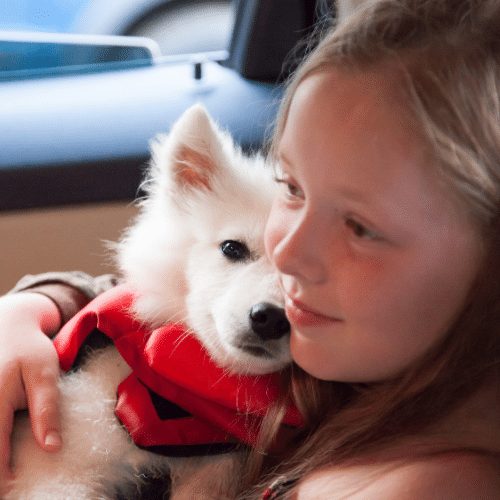Japanese Spitz
December 8, 2020 2021-12-31 6:35Table of Contents
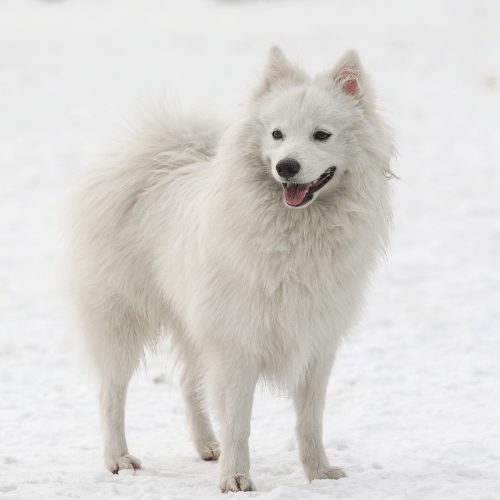
Origin and History of the Japanese Spitz
The Japanese Spitz is a breed that descended from white German Spitz dogs that were brought to Asia (more specifically, Japan) in the 1920s. Throughout the 1920s and 1930s, there were several white spitz dogs imported to Japan from Canada, Australia, the United States, and China.
After World War II, Japanese Spitz breeders crossed several breeds such as the Russian Spitz and the German Spitz in order to perfect the genetic material that characterizes the Japanese Spitz nowadays.
The first Japanese breeders were careful to select healthy and well-tempered individuals that they used for breeding. After being recognized by the Japanese Kennel Club in 1954, the Japanese Spitz made its way around the world after several dogs were exported to Sweden in the 1950s.
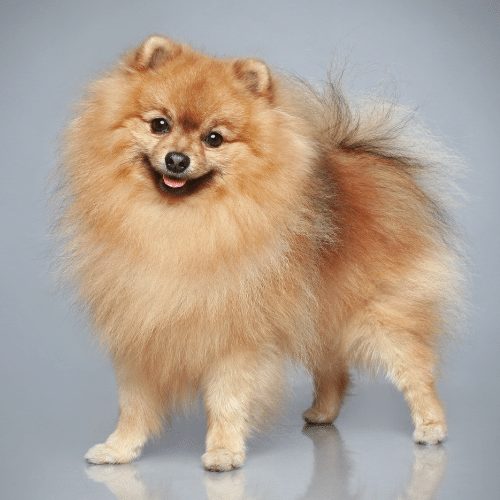
German Spitz
As one of the oldest European dog breeds, the German Spitz is devoted, energetic, and talkative. These dogs are very kid-friendly, and they adapt well to apartment living. They have the same height and weight as their Japanese Spitz descendants, and they tend to live 13 to 15 years.
German Spitz dogs are intelligent, and they love to play. They do not make the right pets for people who are looking for dogs that don’t make a lot of noise since the German Spitz makes the perfect watchdog and will alert you whenever a stranger is nearby.
Appearance of the Japanese Spitz
The Japanese Spitz is a small companion dog with a height ranging from 10 to 16 inches. Females are generally smaller than males. The typical weight for this breed is anything between 11 and 20 pounds. This breed tends to be larger than the Pomeranian.
Japanese Spitz dogs have dark, almond-shaped eyes and triangular, small ears. The skin around their mouth, eyes, and nose is black, whereas the rest of the body is covered in white fur. Their muzzle is pointy, and their body is overall compact.
One of the most appreciated features of the Japanese Spitz is its ‘mane’, which consists of longer fur around its head, from the neck to the shoulders. These dogs have a white, fluffy tail that they curl over their lower back, a characteristic loved by most dog owners.
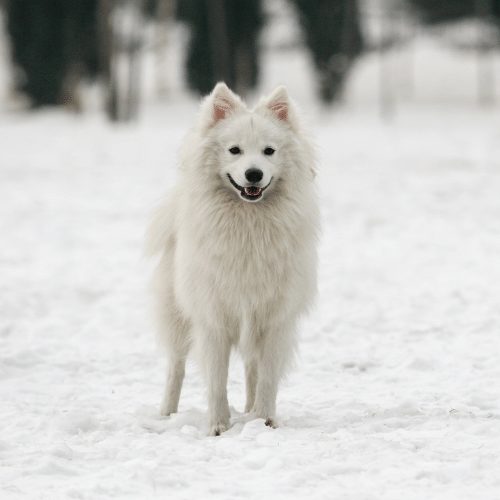
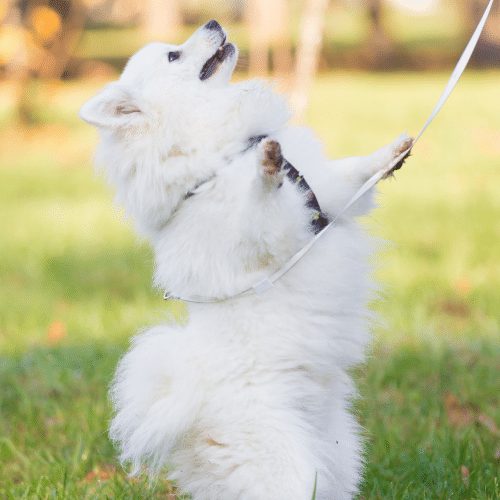
Temperament of the Japanese Spitz
Japanese Spitz dogs are family-friendly and playful, but they have a lot of energy. They need socialization training when they are young, so that interacting with other animals is stress-free.
Most Japanese Spitz dogs are loyal, affectionate, as well as obedient, but you might see them barking at strangers or other dogs when you take them to the park. If they are trained and well-behaved, they will quickly calm down after being reassured by their owners.
They will not thrive if they are left alone for a long time, so they do not make the perfect pet for someone who spends many hours at work and has no children or other pets that can keep a Japanese Spitz company. They can suffer from separation anxiety in the form of excessive chewing and barking.
Japanese Spitz Health and Care
The most common health issues that Japanese Spitz dogs are prone to developing are the following:
- Patellar luxation
A dislocated kneecap tendon is common in this breed, and it can cause osteoarthritis when left untreated. If you get a Japanese Spitz puppy, you should take him or her to regular vet check-ups to make sure that a luxating patella is treated correctly.
- Dry skin
Avoid giving your canine friend too many baths as it can lead to dry skin and dermatitis. Compared to other breeds, the Japanese Spitz has a thick and dry coat, so bathing your pooch too often can unnecessarily remove the oils on the dog’s skin.
- Runny eyes
This can be a problem for the Japanese Spitz. If you don’t regularly clean their tears, the dogs will develop sores and tear-staining.

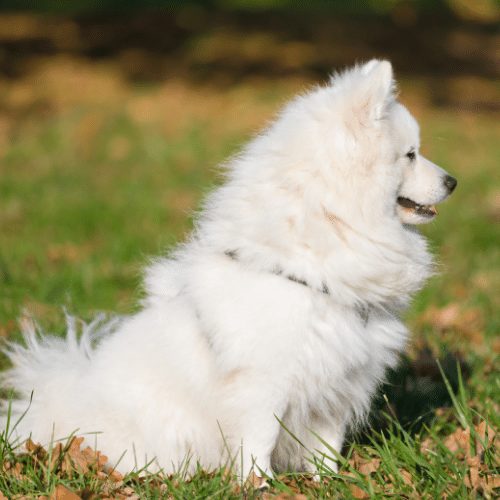
Grooming Your Japanese Spitz
Since Japanese Spitz dogs have white coats, pet parents might feel tempted to give them baths as often as possible. Too many baths can lead to allergies, dry skin, and a variety of other dermatological issues.
Although they might look like they need a lot of effort in the way of grooming, the truth is that a Japanese Spitz’s coat is thick and capable of repelling debris and dirt. However, due to its thickness, it will require regular brushing, so that matting and knots are prevented.
Brush your Japanese Spitz’s coat at least twice a week using a brush that can reach the undercoat, too. Compared to other breeds, this dog has relatively low grooming needs.
Training Your Japanese Spitz
Your Japanese Spitz puppy will not need any specialized training. However, since he will grow up to be a large dog you should make sure that he has basic manners, such as:
- walking nicely on leash
- greeting people politely
- coming when called
Due to the tendency of the breed to be a bit stand-offish with strangers if not socialized properly, you should take care to provide plenty of positive exposure and experiences for your puppy and grown dog. You could take him along to dog-friendly patios, family get-togethers or attend group training classes.
It is important to let the dog progress at his own speed when introducing him to other people and dogs – do not push your puppy into interactions, but let him choose himself when and how he wants to approach others.
Deciding on a Japanese Spitz
A Japanese Spitz has a lifespan of 12 to 16 years, so you are making a long-term commitment when you’re getting a puppy. Since the breed has a lower risk of developing various medical conditions, especially compared to other dog breeds, it is a great option for people who want an overall healthy puppy.
Although some Japanese Spitz dogs cope well with being left by themselves for several hours every day, many can suffer on account of not having enough contact with people or other canine friends.
Get in touch with a Japanese Spitz breeder in your region and ask them whether they wouldn’t allow you to come to visit their kennel and spend some time with puppies and adults alike.

A Japanese Spitz is not the right dog for you if:
- You tend to spend a lot of time away from home
- You can’t take your dog out for long walks every day
- You live in a hot climate
A Japanese Spitz is the right dog for you if:
- You’re looking for a dog perfect for families with children
- You want a dog that can be kept in an apartment
- You love to cuddle and play with your pooch
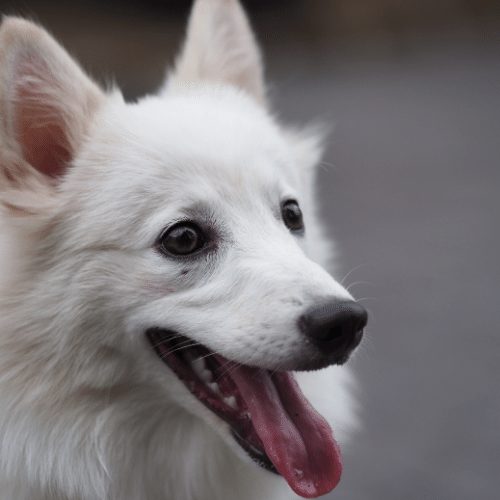
Finding A Japanese Spitz Puppy Breeder
Fortunately, the Japanese did a very good job breeding this dog, so it is exposed to fewer health conditions and complications compared to many other breeds. However, it can still develop patellar luxation, but the issue is not a result of poor genetic material.
Most of the breeders you will find in your country try to maintain the breed’s standards as best as possible. We suggest going to social media and getting in touch with other Japanese Spitz owners to find out where they got their canine friends.
Questions for your breeder
- How long have you been breeding Japanese Spitz dogs for?
- Is this the only type of dog you breed?
- Do you socialize your Japanese Spitz puppies?
- Is the puppy dewormed and vaccinated?
- Do you have any references?
How much is a Japanese Spitz Puppy?
A Japanese Spitz puppy can cost anything from $1,000 to $2,500 and more. The cost is higher if you get a puppy that was bred from parents that won competitions. The reputation of the breeder can also relate to a higher price.
Don’t settle for a low price just because you can’t afford the breed. Although it might be expensive to get a puppy from a well-known breeder, it’s safer in the long run.
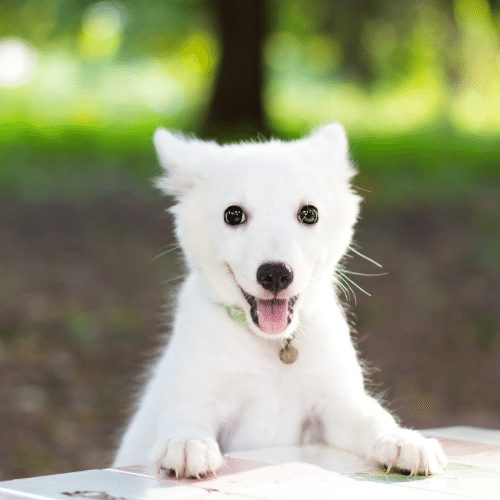
What Japanese Spitz Owners Say:
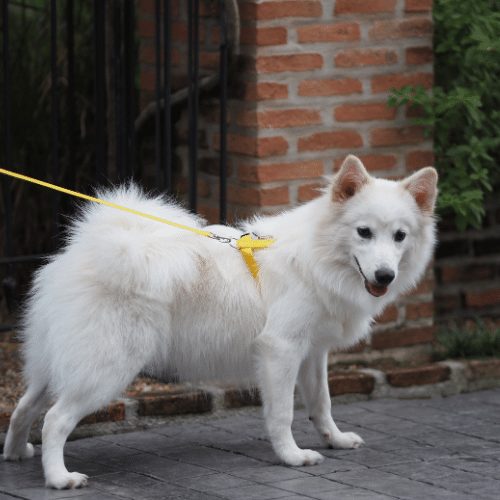
We did have a little trouble practicing good obedience training when she was a puppy, but she picked it up in several weeks.

Frodo is completely in love with the kids, and they feel the same. They take him out for walks, groom him every week, and even spend time with him on the couch while watching cartoons. He’s extremely loyal and friendly, and he tries to protect them each time we go to the park. Frodo is everything we hoped for and more!

